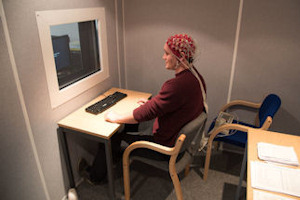New electroencephalogram (EEG) facility for Psychological Sciences
28 Jan 2016
The School of Psychological Sciences formally opened a new electroencephalogram (EEG) facility at a special inauguration event earlier this month

Professor David Ray, Associate Dean for research, joined Professor Rachel Calam, Head of School of Psychological Sciences, at the event held at the EEG facility in the Zochonis Building on 15 January.
The Faculty and the School committed to investing in the upgrading of the existing EEG lab in order to provide a new state-of-the-art facility for use by colleagues across the neuroscience spectrum. The School also plan on making the new lab available to external stakeholders for clinical electrophysiology studies. The facility hosts three electrically shielded recording booths for recording brain activities along with four behavioural studies booths, washing and preparation facility and a reception area.
Professor Calam highlighted the outstanding opportunities the new labs create for research and teaching and thanked the Faculty Estates team and the School PSS team who oversaw the technical and administrative development of the lab while minimising disruption to the daily work in the Zochonis Building.
Professor Ray said: "This investment acknowledges Neuroscience and Neuroimaging as a key Manchester research strength. Manchester can now boast a state-of the-art-facility to rival most competitors on the relevant grant applications."
Professor of Cognitive Electrophysiology, Wael El-Deredy, added: "We are already noticing the improvement in the quality of the data we are acquiring from the new lab. Our challenge now is to convert this investment into impactful research outputs and postgraduate training in Cognitive Electrophysiology."
The photo shows one of the new lab's electrically shielded and sound proof booths from which participants carry out cognitive and perceptual tasks, while their electric brain activities is being recorded.
